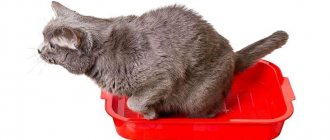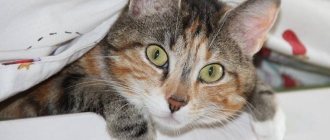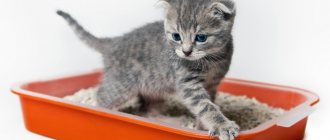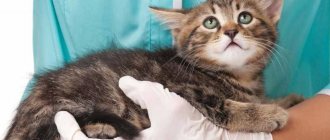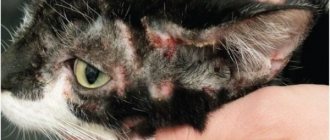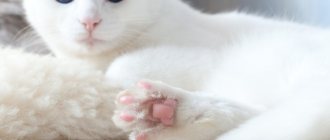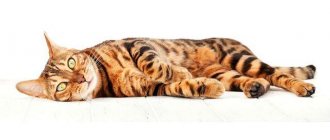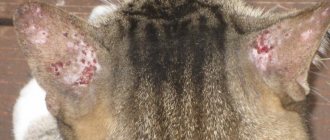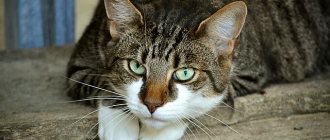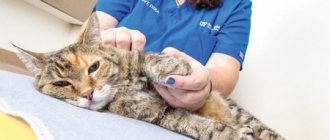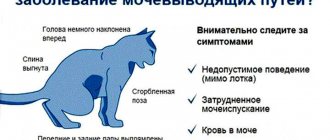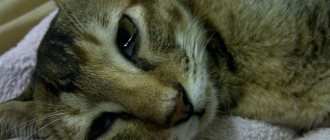What can cause sneezing in a cat?
The most common cause of persistent sneezing is respiratory pathologies, usually caused by herpesvirus or calicivirus. Both viruses infect a variety of animals but are not dangerous to humans. Stress often complicates the disease and increases its invasiveness (rapid reproduction and spread).
Viral infections often lead to secondary bacterial diseases. Fungal infections of the nose also occur in furry pets, but are much less common.
Unlike in humans, allergies are not a common cause of sneezing in cats. But when certain substances enter the nasal cavity, a reflex reaction may occur. Potential irritants include tobacco smoke, litter dust, perfumes, aerosols, and pollen.
Less commonly, sneezing is caused by dental pathologies, inhalation of foreign bodies, and tumors in the nasal passages.
Possible reasons
The mechanism of sneezing in cats is exactly the same as in humans. This is an unconditioned reflex. The process has a protective function, helps cleanse the nasal passages and upper respiratory tract from dust, mucus, and other irritants through a strong and sharp exhalation.
The most common cause of sneezing in both humans and cats is inhaling air containing dust particles. They irritate the nasal passages and cause a sneeze, which is necessary to push the irritating agent out. An animal may sneeze in a room where there is heavy smoke and there are strong and irritating odors. In such cases there is no cause for concern. The cat will most likely hasten to move away from the source of the pungent odor, from the cloud of tobacco smoke. Having freed the airways from foreign presence, she will stop sneezing.
There are also more serious reasons why this may happen.
Allergic reactions
Allergies are a common phenomenon in the modern world. It is observed not only in people, but also in cats. This is especially true for purebred domestic animals bred through selection. They often have allergic reactions.
The following allergens can provoke them:
- household chemicals;
- perfumery;
- tobacco smoke;
- household, construction and other dust;
- pollen from plants, including indoor plants;
- mold;
- components of cat litter;
- exoparasites (lice eaters, fleas), bites of blood-sucking insects;
- means for killing parasitic insects (sprays, aerosols, drops, substances that impregnate a flea collar).
Manifestations of an allergic reaction to a particular irritant may be as follows:
- sneezing;
- lacrimation;
- allergic rhinitis;
- difficulty breathing;
- the cat rubs and scratches its nose.
Neoplasms in the nasal passages
Nasal polyps prevent the cat from carrying out a normal and complete breathing cycle, and she may sneeze quite often. In addition, you may notice that the cat has difficulty breathing and often sleeps with its mouth open. Such neoplasms must be removed, since improper air circulation and impaired breathing can cause serious problems with a number of other organs and systems.
Foreign bodies
A cat may accidentally inhale an object. Her body will try to get rid of it by sneezing many times in a row. Small foreign bodies can be removed independently; the cat can remove dust and similar particles on its own. Sometimes larger foreign bodies can become lodged in the nasal passages and upper respiratory tract, requiring veterinary attention.
Cold
An animal can catch a cold by being exposed to low temperatures for a long time, inhaling very cold air, or sleeping in a draft.
It is especially important to protect your cat from colds after bathing: make sure that she does not sit near open windows or lie on a cool floor.
Signs of a cold are fever, dry and hot nose and paw pads, general weakness, lack of appetite, cough and runny nose.
Symptoms of cat sneezing that should alert their owners
An increase in the frequency of sneezing is already a reason for concern and a visit to the doctor. Delaying a visit to the clinic is dangerous if the animal’s condition has worsened and additional clinical manifestations have appeared.
Dangerous symptoms:
- The appearance of yellow or green mucous discharge and blood.
- Rapidly progressive cough, turning into wheezing.
- Change in breathing, the pet sniffles, whistles, swallows air through its mouth.
- Constantly scratches the area of the mouth and nose with its paw.
- Untidy appearance, small ulcers appearing on the body.
- Photophobia, aggression in response to attempts to pet the pet.
- Weakness, loss of appetite.
- High, falling temperature.
If you detect at least one manifestation, you need to visit a doctor.
Parasites
Cats have helminths that live in the respiratory tract, so they can cause sneezing. These parasites include:
- Eucoleus aerophila - from the intestines with blood, the larvae of this worm migrate to the respiratory organs, where they continue to exist.
- Aelurostrongylus abstrusus - the larvae of these parasites feel great in the lungs of a cat, often without showing themselves, causing only bronchitis and pneumonia in the animal.
- Toxocara cati is a parasite that ends up in a cat's respiratory tract by accident, but nevertheless also causes various diseases, which often manifest themselves as sneezing.
What to do if your cat sneezes often?
Your furry friend needs to be watched. Pay attention to the nature and frequency of sneezing, assess whether the symptom is getting worse. Pay attention to accompanying clinical manifestations: discharge from the eyes, rapid breathing, cough, loss of appetite, and others.
If yellow mucus or swamp-colored blood discharge appears, you should consult a specialist. Mucus must be constantly removed with soft paper napkins moistened with warm water. The animal's temperature is measured. A sick animal should be protected from contact with other pets and walks should be postponed until recovery.
Possible etiological factors will be eliminated. select hypoallergenic detergents and vacuum more often. The tray and bedding are regularly cleaned, and bowls are washed with hot water and safe disinfectants such as baking soda.
Feature of the breed
Some types of cats are inherently predisposed to nasopharyngeal problems. These include breeds that have a flattened muzzle. For example, Persians, exotics, British, Himalayan, Scottish folds. In these types of cats, the anatomy of the muzzle is changed, and immunity is often reduced due to artificial breeding. And if your kitten sneezes very often, think about it: maybe he is a representative of one of these breeds?
Treating a cat for sneezing
Therapy should be prescribed by a doctor after examination and assessment of the general condition of the animal. Tests are performed if necessary.
Therapy is aimed at eliminating etiological factors and alleviating symptoms:
- For respiratory diseases, antiviral drugs are prescribed.
- To strengthen the immune system, immunomodulators are prescribed.
- To prevent and reduce the severity of allergies, antihistamines are used.
- Several times a day, shower the nasal and oral cavities, followed by instillation of nasal agents.
- Be sure to carry out antiparasitic therapy.
Be sure to read:
A cat’s eyes are running: normal or pathological, reasons, what to do, how to treat, prevention
At home, the predator is provided with peace and regular drinking. It is recommended to adhere to a diet using special feed. Preference is given to liquid canned food.
Medicines
The type of drugs and treatment regimen depend on the disease and are determined by the veterinarian.
- Antiviral agents: Fosprenil, Maxidin, Vitafel
- Antibiotics (penicillins and cephalosporins): Cefa-kure, Amoxicillin, albipen LA, Ampiox for young animals.
- Immunostimulants : Mastim, Immunofan
- Intranasal drops: Anandin, Fosprenil, Maxidin.
- Antihistamines: Terfenadine, Clemastine.
- Antihelmintics: Febtal, Prazitel.
- Means for eliminating and preventing various manifestations: Ringer's solution for dehydration, Vetom-1 for diarrhea
- Vitamin complexes: Gamavit, Tsamaks. SA-37.
- Polyvalent (containing more than one type of antigen) vaccines Multifel-4, Quadrikat, Nobivak Rabies.
The vaccine is given after complete recovery.
Folk remedies
In parallel with the doctor’s prescriptions, you can use traditional recipes.
- Saline solution. Stir half a tbsp in a liter of water. l. salt. The nasal and oral cavities are washed with the solution.
- Aloe juice is a natural antiseptic. Place a drop in each nostril three times a day.
- Herbal decoction. Mix according to Art. l. pharmaceutical chamomile and marigold flowers, pour boiling water (liter), leave for 2 hours. The affected organ is washed with the filtered cooled solution.
Saline solution can be used to rinse before using intranasal drops prescribed by a veterinarian.
A cat sneezes blood - how dangerous is it and what to do?
Blood indicates damage to the mucosa. They can be caused by a foreign body, progressive infection by bacteria or a virus. The nasal passage should be inspected; visible accessible particles (lint, wool) are removed without using tweezers. If lumps are detected, you should consult a doctor. They may indicate neoplasms.
Infections should be treated by a doctor. The breeder can only treat the nose with water or a wet soft cloth. You cannot wash the cavity yourself. If bleeding caused by scratching is detected, the pet is urgently taken to the veterinary clinic or a doctor is called to the house.
Be sure to read:
A kitten's eyes are festering: normal or pathological, reasons, what to do at home, medications
How to prevent a cat from sneezing?
Simple preventive measures will help prevent the appearance of an unpleasant symptom:
- Regular cleaning of the premises using hypoallergenic cleaning products. Upholstered furniture is cleaned of animal hair. Particular attention is paid to cleaning the litter.
- Maintain humidity using special humidifiers or a boiling kettle of water.
- Coarse granular filler is used for the tray; it does not stick together and produces less dust.
- Try not to spray perfume near your pet.
- Deworming is carried out regularly.
- Vaccination is considered an effective method for preventing infections. Vaccinations against leukemia, viruses, and rabies begin at the age of 4-6 months.
Regardless of how he feels, his furry friend is taken to a veterinary clinic for a preventive examination every six months.
Prevention
To protect your pet from diseases, you should vaccinate it in a timely manner. The veterinarian will tell you about the schedule of vaccinations that the cat needs to receive, starting from the age of two months. Today, quite effective vaccines have been developed against panleukopenia, caliverosis, rhinotracheitis, and rabies. There is a vaccine against toxoplasmosis, but it is not very effective. They do not exist from mycoplasmas.
In addition, it is necessary to regularly give your pet a course of antiparasitic drugs.
To prevent sneezing and runny nose in cats, the following preventive measures should be taken:
- if an allergy is suspected, it is necessary to find out what exactly is the allergen for the pet, and then try to eliminate or minimize the impact of the provoking factor;
- to avoid colds, you should not let the animal go for a walk in the cold or heavy rain, you should also equip it with a bed in a warm place where there are no drafts, immediately dry it with a hairdryer after bathing and do not allow it to be in drafty places;
- try to protect the cat from communicating with stray brothers in order to avoid infection with dangerous infections, make sure that it does not eat its hunting trophies (rodents, birds);
- if a cat has asthma, then you should avoid contact with allergens, even potential ones, keep the house clean, regularly carry out wet cleaning, and protect the cat from tobacco smoke.
Caring owners take all domestic cats to a veterinarian once a year for medical examination. This way you can identify dangerous diseases at an early stage, provide timely assistance to your pet and prevent dangerous consequences.
